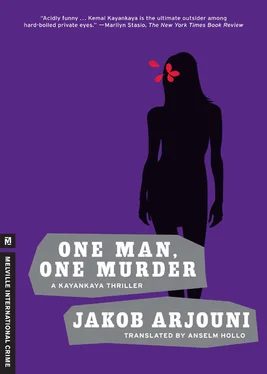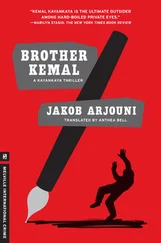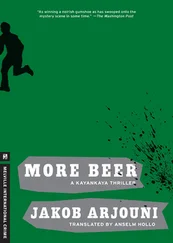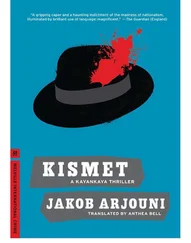Jakob Arjouni - One Man, One Murder
Здесь есть возможность читать онлайн «Jakob Arjouni - One Man, One Murder» весь текст электронной книги совершенно бесплатно (целиком полную версию без сокращений). В некоторых случаях можно слушать аудио, скачать через торрент в формате fb2 и присутствует краткое содержание. Жанр: Криминальный детектив, на английском языке. Описание произведения, (предисловие) а так же отзывы посетителей доступны на портале библиотеки ЛибКат.
- Название:One Man, One Murder
- Автор:
- Жанр:
- Год:неизвестен
- ISBN:нет данных
- Рейтинг книги:3 / 5. Голосов: 1
-
Избранное:Добавить в избранное
- Отзывы:
-
Ваша оценка:
- 60
- 1
- 2
- 3
- 4
- 5
One Man, One Murder: краткое содержание, описание и аннотация
Предлагаем к чтению аннотацию, описание, краткое содержание или предисловие (зависит от того, что написал сам автор книги «One Man, One Murder»). Если вы не нашли необходимую информацию о книге — напишите в комментариях, мы постараемся отыскать её.
One Man, One Murder — читать онлайн бесплатно полную книгу (весь текст) целиком
Ниже представлен текст книги, разбитый по страницам. Система сохранения места последней прочитанной страницы, позволяет с удобством читать онлайн бесплатно книгу «One Man, One Murder», без необходимости каждый раз заново искать на чём Вы остановились. Поставьте закладку, и сможете в любой момент перейти на страницу, на которой закончили чтение.
Интервал:
Закладка:
We crossed the entrance hall and walked down a corridor to the library. Books from floor to ceiling on all four walls, four cordovan armchairs on the dark brown parquet floor. Next to each armchair stood a small table with a lamp and an ashtray; in the middle of the room there was a big table with six chairs. Open on the table, next to further ashtrays, lay an old leather-bound tome.
“Have a seat, sir. He’ll be with you in a moment.”
He left the room and closed the door. After I had walked along the shelves for a while, I sat down in front of the old tome and read. On the lam from the cops, an old geezer was carrying an unconscious guy through the sewers of Paris. The water reached to his hips, and the ground under his feet was uneven and muddy. Just as he saw the lantern carried by a police sergeant and stopped to squeeze himself close to the wall, a voice behind me said: “You want to see me?”
I spun around, and there he stood: a small, hollow-cheeked gentleman with thin reddish blond hair and a tic that kept twitching his head to one side every time he spoke, as if a fly had landed on his face. He was wearing a gray three-piece suit with a dark blue ascot and a silver watch chain across his vest. Arms crossed, right foot slightly forward, on his face an expression of calm combativeness, he stood there against the red and brown background of the wall of books looking like a not entirely successful portrait of royalty-Eberhard Schmitz, the king of the railway station district.
Clumsily, I pointed at the book. “I was reading-very suspenseful.…” I nodded.
He smiled. Then he walked around the table, sat down across from me and pulled a silver case from his vest pocket. It opened with a dignified click, and he offered me a selection of various brands of cigarettes. “Would you like one?”
There was something slightly awesome about his nervous tic. I picked an unfiltered number of a brand I didn’t know. During the subsequent ceremony which consisted of his selecting a cigarette, tapping it against his thumbnail, lighting mine, lighting his, and putting the lighter back in his pocket, the gaze of his yellow eyes never left my face. Finally, he took the cigarette out of his mouth and remarked, with a quick glance at the book: “I’m glad to see that gardeners are able to appreciate things beyond mowed lawns.”
“Yes, indeed.” I nodded again. “The only problem is that I’m in no position to tell you what gardeners appreciate.”
“You’re saying that you have as much in common with gardeners as I have with persons who do not take action when strangers trespass on their property without permission?”
“That’s about it. Even though I don’t know whom you’re referring to.”
“I’m referring to you.”
“Then I may assume that the people whose tracks I found in Gellersheim were no strangers to you? That they had been lodged there with your consent?”
A pause. He used the ashtray, leaned back and ran his palm across the edge of the table, as if to see how sharp it was.
“Who are you?”
“Kemal Kayankaya, private investigator.”
“Private investigator …” He dragged on his cigarette and disappeared for a moment in a cloud of smoke. “One of those dirty types who make most of their money through blackmail.”
“There’s bad apples in every barrel. Private investigators, property owners-you name it. I once saw a Salvation Army officer empty a collection box into his own pocket, and-”
He cut me off. “Let’s get down to business.”
I extinguished my cigarette and took the ostentatious watch out of my pocket. I slid it across the table.
“I found it on a dead man. In your house. And there was enough stew left for half a regiment. Tell me where those people are now, and I’ll give you time to remove the corpse.”
After he had examined the watch from all sides, he carefully put it back on the table and shook his head.
“That house has stood empty for three years. Only the gardener has a key.”
“That’s not what I understood from your secretary.”
“It must have been a misunderstanding.”
“What about the dead man?”
He stressed each word separately: “That, too, was a misunderstanding.”
“So be it. Guess I’ll go to the police, to clarify all the misunderstandings.”
I reached for the watch but he was faster. “You’ll leave that here.”
“You like it that much? I can tell you where you can get one. Quite cheaply, too.”
He ignored me and slipped the watch into his breast pocket, pulling out a checkbook with the same motion. “You won’t go to the police. At this time, I can’t afford any publicity, no matter how far-fetched.” While the butt of his cigarette glowed and darkened in the ashtray, and I wondered if he’d really let me off so easily, he made out a check for twenty thousand marks.
He handed it to me, and my jaw dropped. “Holy smoke! It has to be a major misunderstanding.”
With a condescending little smile, he put his fountain pen and check book back where they belonged, pushed himself away from the table, and stood up. “I’m used to such affairs, and I know that I can save myself a lot of grief by spending a few dimes. Dimes-you understand?”
I nodded. “Sure. Dimes.” I folded the check. He waited until I had put it in my wallet. Then he pointed at the door. I would have liked to find out the title of the book about the old geezer, but it didn’t seem like the right time to ask. As we walked out into the entrance hall he looked almost contented. “You see-you are a blackmailer.”
“You don’t want to know why I searched your house? It doesn’t interest you at all?”
“No, it doesn’t.” We walked a couple of steps.
“What if I go to the police anyway?”
He stopped and looked down at the floor. For several seconds, all that was heard was the sound of our breathing. Finally, he looked at me and said, with a mildly sad tinge to his voice: “Listen carefully, young man. You better not do that, if you want to cross a street safely in this city, or in this country, or anywhere in the world. I am a peace-loving man-hence that check-but a mere hint from me would suffice to wipe you off the face of the earth. In case you haven’t quite got the picture: You’re talking to Eberhard Schmitz. And who are you? There’s a difference. One of the greatest magnitude.”
“For sure.” I nodded, for the last time. “You may well be right about that.” Then I pointed at his chest. “But we’ll both die of lung cancer.”
11
Loaded down with sandwiches, cookies, chocolate, newspapers, a bottle of Scotch, and two bottles of water, I left the main railway station. It was almost ten-thirty at night. I hurried across the square and crossed the first street. At the second crossing I had to stop for a herd of tourist buses. Suddenly a bell rang behind me, and someone screeched hysterically: “Can’t you see? This is a bicycle lane!”
I whipped around and roared: “Don’t you know how to ride that thing? You’ve got ten yards leeway there.”
The bicyclist braked, turned, and approached me with a stem missionary look on his face. It was a young man in a green-glittering Fifties-style outfit, stiff blow-dried hair, and a T-shirt that said Born to Be Wild.
“This is a bicycle lane. It’s for bicycles. I could have knocked you down, and it would have been your fault,” he informed me, nodding to his own words and coming to a stop in front of me. It was obvious that he expected some sign of gratitude or remorse, and it seemed to me that he would have liked to prolong our conversation.
I left him standing and ran across the street to my car. As I passed him a short while later behind the railway station, I was tempted to show him a perfectly legal brake test.
Читать дальшеИнтервал:
Закладка:
Похожие книги на «One Man, One Murder»
Представляем Вашему вниманию похожие книги на «One Man, One Murder» списком для выбора. Мы отобрали схожую по названию и смыслу литературу в надежде предоставить читателям больше вариантов отыскать новые, интересные, ещё непрочитанные произведения.
Обсуждение, отзывы о книге «One Man, One Murder» и просто собственные мнения читателей. Оставьте ваши комментарии, напишите, что Вы думаете о произведении, его смысле или главных героях. Укажите что конкретно понравилось, а что нет, и почему Вы так считаете.












